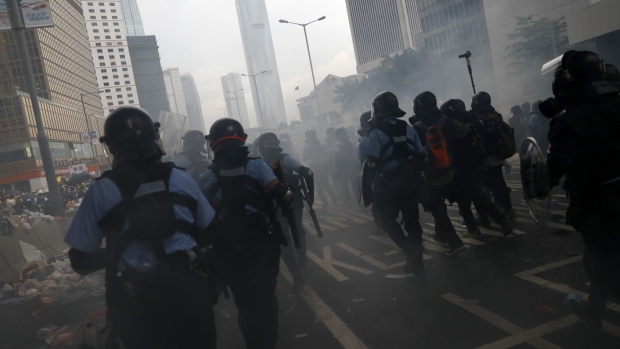Jun 13, 2019
Hong Kong’s Financial Elite Grow Uneasy as China Tensions Rise
, Bloomberg News

(Bloomberg) -- They executed trades, signed deals and wooed clients.
But even as Hong Kong’s financial and corporate elite carried on in the face of mass demonstrations this week, a sense of unease about the city’s future was palpable in interviews with more than a dozen traders, bankers and executives.
As police fired tear gas and rubber bullets at charging protesters in the central business district on Wednesday, conversations in the skyscrapers above turned to the potential fallout from an extradition bill that critics warn will erode Hong Kong’s prized judicial independence from China. One senior executive at a global investment bank said some professionals are questioning whether the city will remain a safe place to live and work.
“People could feel the tear gas and pepper spray on the way home,” said the banker, who like several others quoted in this story asked not to be identified discussing a politically charged subject. “We all have back-up plans in case of a dramatic change.”
For international companies that maintain regional headquarters and employ thousands of workers in Hong Kong, the question is whether rising political risks could ultimately threaten the former British colony’s appeal as a gateway to China.
Read more: Hong Kong Craves Autonomy as China Demands Loyalty
Only a small fraction of those interviewed over the past two days said they’ve seriously considered leaving. For all the concern that China is chipping away at the “one country, two systems” framework that underpins Hong Kong’s status as a global business hub, few expect an imminent exodus.
Investors in the city’s $5.2 trillion stock market have so far remained calm, with the benchmark Hang Seng Index losing a modest 1.8% over the past two days. One private banker said the protests didn’t come up as he entertained clients at Hong Kong’s Sha Tin horse-racing track on Wednesday.
While some employees at global banks including Barclays Plc and Goldman Sachs Group Inc. worked from home this week, there were no signs that the firms’ operations had been materially affected by the protests. HSBC Holdings Plc, the city’s dominant lender, said it was operating as usual. Aside from a few branch closures near demonstration sites, the Hong Kong Monetary Authority said the financial system was running smoothly.
The worst of the protests may have already passed, said Louis Tse, managing director at VC Brokerage Ltd. Crowds in the central business district were notably smaller on Thursday, while Hong Kong lawmakers delayed plans to debate the extradition bill for a second day.
Even if tensions flare again, Tse said investors have taken comfort from the fact that Hong Kong’s Occupy Central movement in 2014 eventually fizzled without too much damage to the city and its stock market.
Others argue that the extradition bill has raised the stakes. They say it could open the door for anyone who runs afoul of the Chinese government to be arrested on trumped-up charges in Hong Kong and sent to the mainland, where they would face what the U.S. State Department has called a “capricious legal system.” The law would apply to Hong Kong passport holders, foreign residents and even people passing through on business or as tourists.
“It is a concern,” said Andrew Sullivan, a director at Pearl Bridge Partners. “If this bill is enacted I can well imagine a number of American executives wanting to switch their headquarters to Singapore.”
Read more: Stock Analyst Spooked by Extradition Law May Leave Hong Kong
Carson Block, the U.S.-based short seller known for his critical reports on Chinese companies, said he’ll think twice about visiting Hong Kong if the extradition bill is passed. He said the city is changing for the worse as China encroaches on its governance.
“The West once held out hope that the mainland would become more like Hong Kong,” said Block, the founder of Muddy Waters Capital LLC. “Clearly the opposite has happened, and this is unfortunate for the rule of law and individual liberties.”
Some worry that Hong Kong, which is consistently ranked near the top of global surveys on the ease of doing business, could become a much less predictable place as political tensions escalate.
PineBridge Investments, which oversees about $93 billion, was among several firms that canceled or delayed events this week because of the protests. Hong Kong’s government postponed a high-profile land auction that was estimated to fetch as much as $1.7 billion.
“Hong Kong feels like it’s becoming more radicalized,” said one hedge fund executive who walked through tear gas on his commute home on Wednesday. “I would expect these bouts of violence to continue to be there over the next decade, if not to get even stronger.”
--With assistance from Alfred Liu, Bei Hu, Crystal Tse, Bruce Einhorn and David Ramli.
To contact the reporters on this story: Manuel Baigorri in Hong Kong at mbaigorri@bloomberg.net;Benjamin Robertson in Hong Kong at brobertson29@bloomberg.net;Moxy Ying in Hong Kong at yying13@bloomberg.net
To contact the editors responsible for this story: Michael Patterson at mpatterson10@bloomberg.net, ;Philip Lagerkranser at lagerkranser@bloomberg.net, Sam Mamudi
©2019 Bloomberg L.P.







